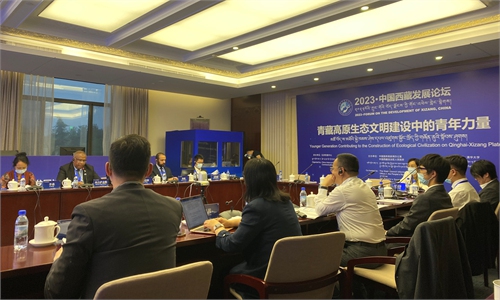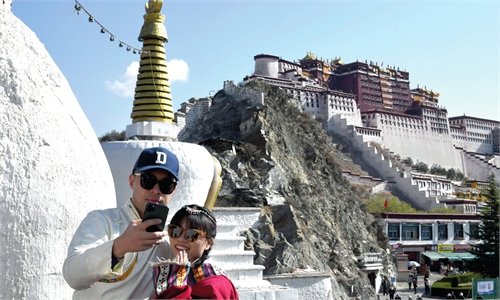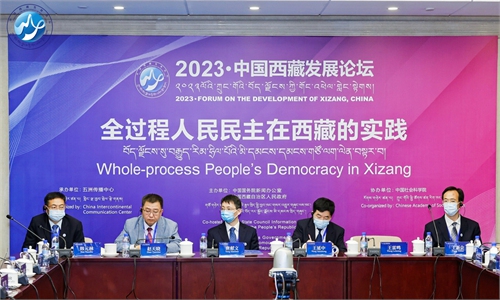IN-DEPTH / DIPLOMATIC CHANNEL
Unity, civility and modernization: Foreign diplomats, experts narrate miraculous development in Xizang through ‘four-season’ journey
Editor's Note:
In his report to the 20th National Congress of the Communist Party of China (CPC), Xi Jinping, general secretary of the CPC Central Committee, proposed to comprehensively advance the great rejuvenation of the Chinese nation on all fronts through a Chinese path to modernization - a modernization of a huge population, of common prosperity for all, of material and cultural-ethical advancement, of harmony between humanity and nature, and of peaceful development.
For a long time, the Western perspective has dominated the narrative on modernization. However, China's extraordinary achievements in all aspects demonstrate that there are alternative methods to modernization. The Chinese modernization is a new model for human advancement, and it dispels the myth that "modernization is equal to Westernization," presents another picture of modernization, expands the channels for developing countries to achieve modernization, and provides a Chinese solution to aid the exploration of a better social system for humanity.
To understand the Chinese path to modernization, the Global Times is launching a new series that explores how foreigners perceive Chinese modernization through their on-site experiences in the country. In this installment, we will delve into the captivating journey of foreign diplomats and experts in the magnificent region of Xizang.
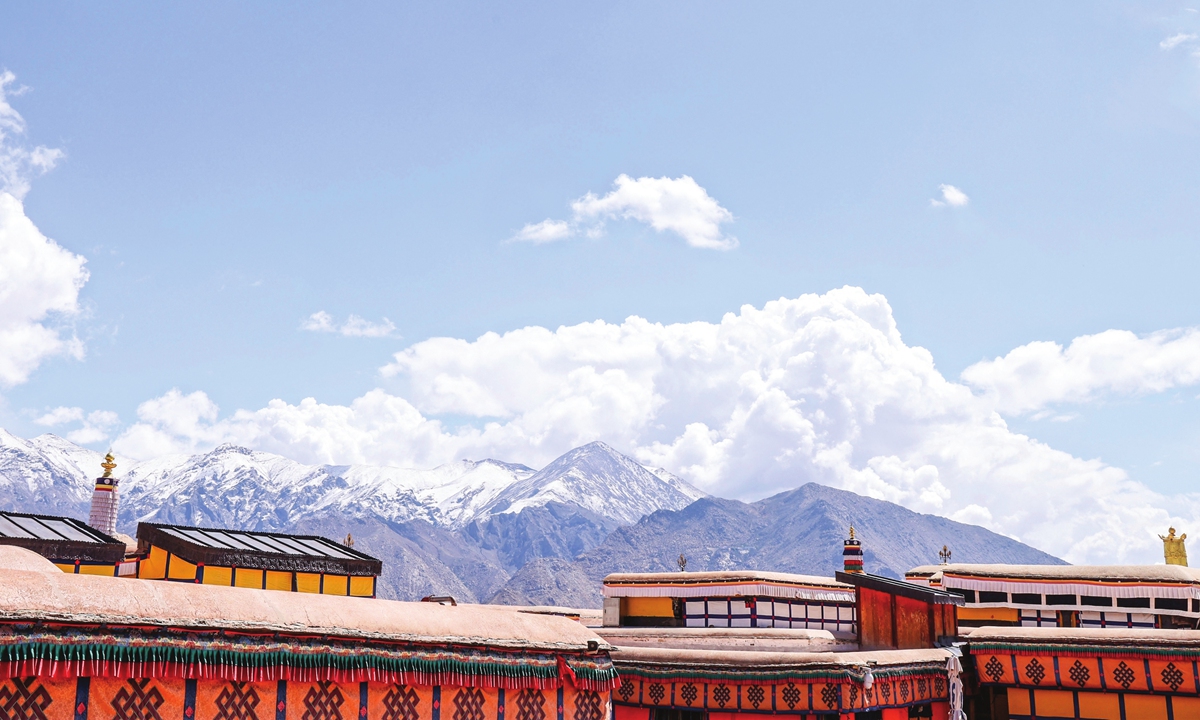
Guillaume Guibe had imagined the children study in tents.
The French engineer working in Beijing planned to pay a visit to an elementary school in Baingoin county, Nagqu prefecture in Southwest China's Xizang Autonomous Region. The school sits on a high plateau 4,700 meters above sea level, and is known as "a school close to the sky."
However, far from Guibe's expectation, when he arrived at the county town, he saw a new and modern school, with a standard playground, and almost 30 modern classrooms and dormitory buildings for students. The main teaching building is constructed in the Tibetan architectural style, resembling a Tibetan palace, standing tall in Baingoin.
In the school, Guibe talked with local students, who were polite and confident. Nima Raji, a 13-year-old student, wrote down Guibe's name in Chinese characters and Tibetan letters. She also showed her English abilities to Guibe.
From her bright smile and sparkling eyes, Guibe said he saw the girl's belief of miracles in the future.
"For Xizang region, the third pole of our planet, miracles of nature stand everywhere, and the people here are also creating miracles," Guibe said in his vlog.
On Tuesday, at opening ceremony of the 2023 Forum on the Development of Xizang in Beijing, Guibe, shared stories on what he has seen and felt during his recent visit to the region.
The event was attended by more than 150 diplomats, scholars, and industry representatives from 36 countries and regions, who shared their observations and suggestions on Xizang's development.
President Xi Jinping sent a congratulatory letter to the forum, in which he said he hopes that on the new journey of advancing Chinese modernization, Xizang can fully and faithfully apply the new development philosophy on all fronts, step up efforts to promote high-quality development, and strive to build a prosperous, harmonious, and beautiful new socialist Xizang underpinned by unity, civility, and modernization so that the people of Xizang can enjoy better and more fulfilled lives.
The day also marked the 72nd anniversary of Xizang's peaceful liberation. On May 23, 1951, the 17-Article Agreement was signed by the central government and the local government of Xizang on the peaceful liberation of the region.
Since then, the people of Xizang have been free from the fetters of invading imperialism for good, and embarked on a bright road of unity, progress, and development along with all the other ethnic groups in China.
Xizang's GDP and GDP per capita reached 213 billion yuan ($30 billion) and 58,438 yuan in 2022, a jump of 347 and 110 times from the time of peaceful liberation 72 years ago. People's life expectancy doubled from 35.5 years in 1959, the time of democratic reform, to 72.19 years today. People in Xizang enjoy free education for 15 years, the Global Times also learned from the Xizang regional government on Tuesday.
The development of the small county of Baingoin is not an isolated case - it is a vivid glimpse into Xizang's development under the process that the Chinese Path to Moderation has achieved. In recent decades, Xizang has experienced a distinctive approach to development that effectively balances economic progress with the preservation of cultural heritage and the environment.
Find the answers
Guibe described his way to Baingoin as a "four-season journey," on which he passed through green meadows and white snow land, accompanied by various wild animals.
"I was impressed most, not only by the unique landscapes in Xizang, but also by how well the cultures and traditions are preserved there, and how fast the development has been in the region," he told the Global Times on Tuesday during the forum. "It has only been around 70 years, and you can see people in Xizang region are living a totally different life."
During and after his journey, he thought about how China could complete such development in Xizang region with such a harsh environment and a small population.
His questions were answered by what he saw in the region.
First of all, it is achieved through massive investment into quality infrastructure: Electricity is everywhere, even reaching the most isolated villages and houses in the high mountains. Roads are modern, safe, and comfortable to drive on. Speed radars were even installed at the entrance of villages to protect people and domestic animals.
"At 5,200 meters high, I could get my emails and chat on my mobile," he noted, with a surprised look.
Additionally, there is smart business investment. "I saw how quality tourism, respectful of nature, preserving and promoting this unique cultural heritage could facilitate the development of good standard family hotels, fine restaurants, museums, activities for tourists as well as the development of a dynamic network of local sub-contractors," he said.
Moreover, he noticed there is the exceptional movement of solidarity from Chinese provinces and companies.
For instance, a school was constructed thanks to aid and investment from the China Petroleum & Chemical Corporation, a state-owned company in which Guibe works for. The construction of the school solved the difficulty faced by agricultural and pastoral children in accessing education.
"I wish people in my hometown could someday visit the region by themselves," Guibe said, while being asked what message he would like to send to his people, as the region has faced numerous scurrilous charges by some West media for years.
"This trip opened my eyes, far away from the clichés I had accumulated from my childhood about Xizang, on a unique experience of development that many countries should actually be inspired by," he said.
Traditional and modern
Vikash Kumar Singh, a lecturer at the Asia Institute of Beijing Foreign Studies University from India, could not help but to share his pictures taken in Xizang on his WeChat account during his trip to the region last week.
He posed in a Tibetan housing yard in front of a monastery, as well as before boarding the Lhasa-Nyingchi railway bullet train, which was the country's first electrified railroad operating in the plateau region.
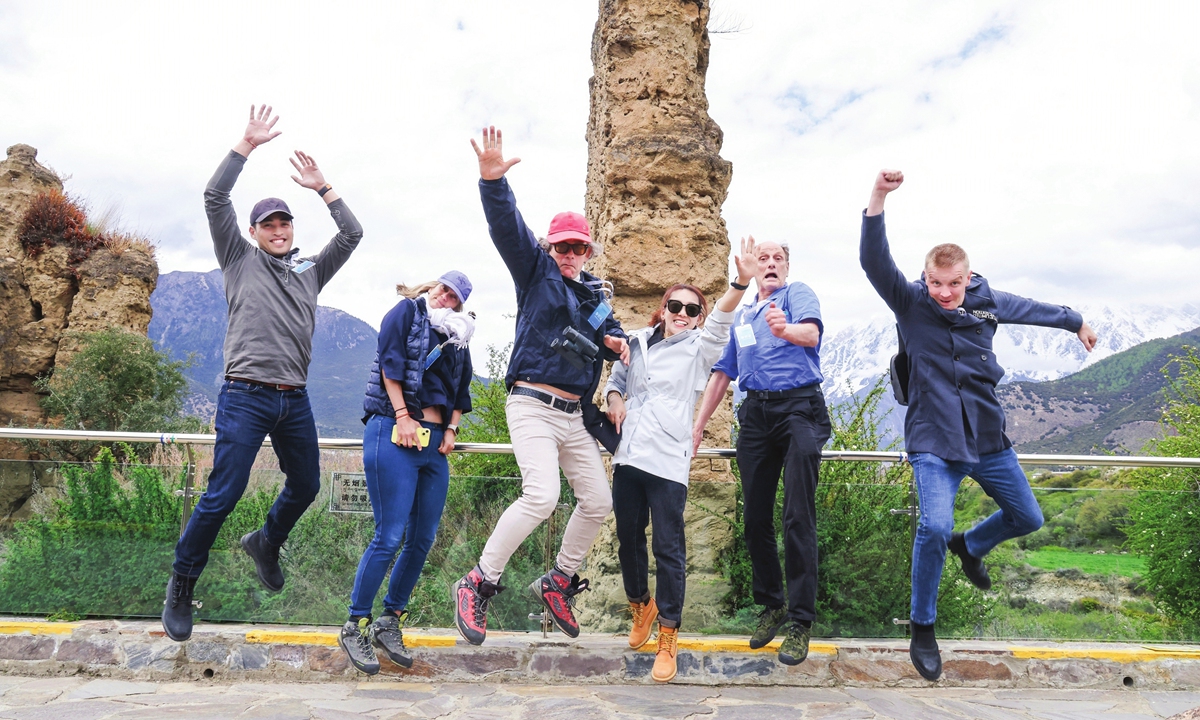
"They [residents in Xizang] are keeping their tradition while developing themselves," he noted. They have the right to go to a good school, to go to the cinema hall and to sit in a high-speed train, instead of being judged by people who sit in an office, enjoying air conditioned, and are unwilling to see the residents in Xizang living a good life," Singh said.
"I can see that people in Xizang are enjoying a very peaceful life in a very harmonious society," he said, noting that the stability of the region would also benefit the Southern Asia region.
Inspiring the world
The modern achievements and experiences of Xizang not only benefit the people of this region or China but also hold valuable lessons for the entire world.
Along with Singh, a group of foreign diplomats, scholars, and experts paid a one-week trip to Xizang, to learn about the traditional cultures, ecology, and the life of the herdsmen and farmers there. The visitors were impressed by the plateau landscapes in Xizang, as well as the fast development in the region.
"I am fascinated by the scenery, by the mountainous terrain, and the people on the Tibet plateau," Manasa Tagicakibau, Ambassador of Fiji to China, told the Global Times during the forum.
"We listened to stories that the villages have been lifted out of poverty and their lives have changed greatly in the last decade, thanks to the assistance of the regional and central governments," he said.
"They are now enjoying a more prosperous life with modern infrastructure - the road networks, the railways, and the airport," the ambassador said. "I'm impressed with the work that the government has done to reach out to these places that are very remote and high to carry out modernization and development, while still maintaining and preserving the ecology and the environment."
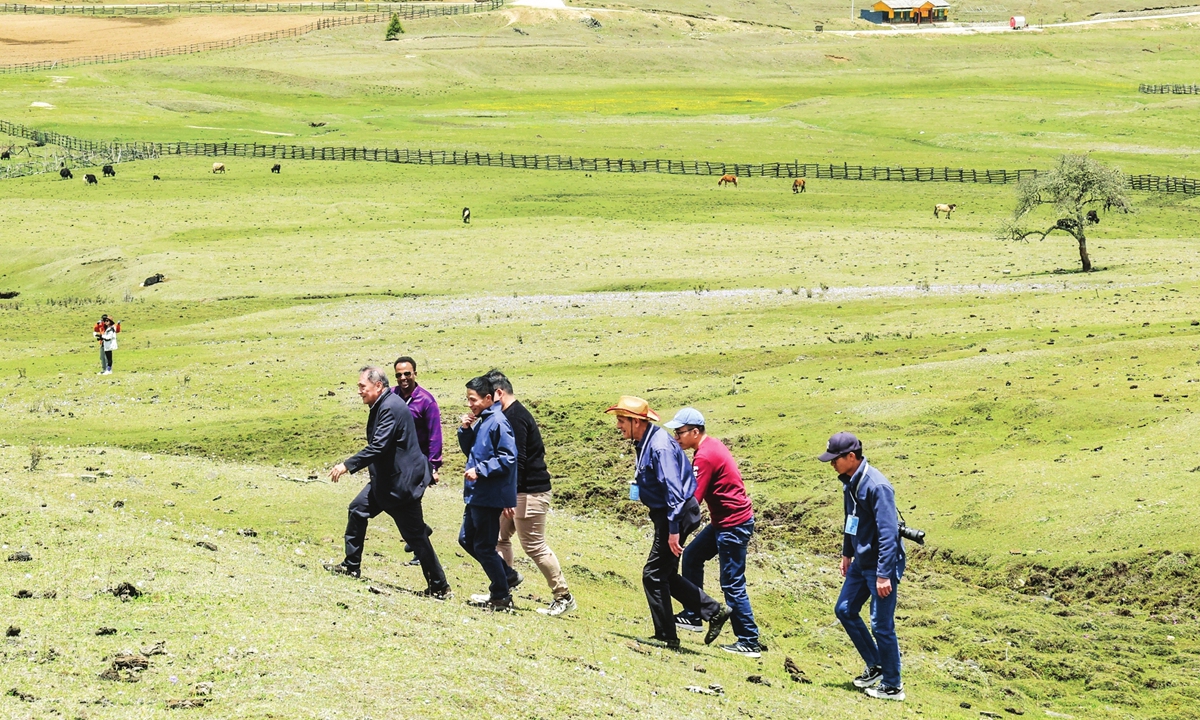
Maria Gustava, Ambassador of Mozambique to China, said that Xizang's development can inspire other countries like her own in terms of poverty reduction and development.
"I was impressed that they have energy - even very remote areas, and with how they are expanding the agriculture in such harsh conditions. They are preserving their own culture, beliefs, language, and the ecology," she noted.
Alexander Birle from the Hanns Seidell Foundation, a German-based NGO for education, told the Global Times that he was surprised by the development of high-quality education. "We visited two schools, one elementary school in Nyingchi and one high school in Lhasa. The schools are very open-minded and want to get in contact with the outside world," he said.
"When you arrive in Xizang, you realize that everything is different from what you have heard from some Western media sources," said Abdilahi Ismail Abdilahi from Somalia, a teacher at the Beijing Foreign Studies University, who was impressed by the green mountains and modern buildings during his visit to Nyingchi and Lhasa earlier this month.
"As long as you see it with your own eyes, you realize what is going on in Xizang," he told the Global Times, noting that the experience of Xizang's development could also inspire African countries.
In his report to the 20th National Congress of the Communist Party of China (CPC), Xi Jinping, general secretary of the CPC Central Committee, proposed to comprehensively advance the great rejuvenation of the Chinese nation on all fronts through a Chinese path to modernization - a modernization of a huge population, of common prosperity for all, of material and cultural-ethical advancement, of harmony between humanity and nature, and of peaceful development.
For a long time, the Western perspective has dominated the narrative on modernization. However, China's extraordinary achievements in all aspects demonstrate that there are alternative methods to modernization. The Chinese modernization is a new model for human advancement, and it dispels the myth that "modernization is equal to Westernization," presents another picture of modernization, expands the channels for developing countries to achieve modernization, and provides a Chinese solution to aid the exploration of a better social system for humanity.
To understand the Chinese path to modernization, the Global Times is launching a new series that explores how foreigners perceive Chinese modernization through their on-site experiences in the country. In this installment, we will delve into the captivating journey of foreign diplomats and experts in the magnificent region of Xizang.

Lhasa Photo: Courtesy of the Forum on the Development of Xizang
Guillaume Guibe had imagined the children study in tents.
The French engineer working in Beijing planned to pay a visit to an elementary school in Baingoin county, Nagqu prefecture in Southwest China's Xizang Autonomous Region. The school sits on a high plateau 4,700 meters above sea level, and is known as "a school close to the sky."
However, far from Guibe's expectation, when he arrived at the county town, he saw a new and modern school, with a standard playground, and almost 30 modern classrooms and dormitory buildings for students. The main teaching building is constructed in the Tibetan architectural style, resembling a Tibetan palace, standing tall in Baingoin.
In the school, Guibe talked with local students, who were polite and confident. Nima Raji, a 13-year-old student, wrote down Guibe's name in Chinese characters and Tibetan letters. She also showed her English abilities to Guibe.
From her bright smile and sparkling eyes, Guibe said he saw the girl's belief of miracles in the future.
"For Xizang region, the third pole of our planet, miracles of nature stand everywhere, and the people here are also creating miracles," Guibe said in his vlog.
On Tuesday, at opening ceremony of the 2023 Forum on the Development of Xizang in Beijing, Guibe, shared stories on what he has seen and felt during his recent visit to the region.
The event was attended by more than 150 diplomats, scholars, and industry representatives from 36 countries and regions, who shared their observations and suggestions on Xizang's development.
President Xi Jinping sent a congratulatory letter to the forum, in which he said he hopes that on the new journey of advancing Chinese modernization, Xizang can fully and faithfully apply the new development philosophy on all fronts, step up efforts to promote high-quality development, and strive to build a prosperous, harmonious, and beautiful new socialist Xizang underpinned by unity, civility, and modernization so that the people of Xizang can enjoy better and more fulfilled lives.
The day also marked the 72nd anniversary of Xizang's peaceful liberation. On May 23, 1951, the 17-Article Agreement was signed by the central government and the local government of Xizang on the peaceful liberation of the region.
Since then, the people of Xizang have been free from the fetters of invading imperialism for good, and embarked on a bright road of unity, progress, and development along with all the other ethnic groups in China.
Xizang's GDP and GDP per capita reached 213 billion yuan ($30 billion) and 58,438 yuan in 2022, a jump of 347 and 110 times from the time of peaceful liberation 72 years ago. People's life expectancy doubled from 35.5 years in 1959, the time of democratic reform, to 72.19 years today. People in Xizang enjoy free education for 15 years, the Global Times also learned from the Xizang regional government on Tuesday.
The development of the small county of Baingoin is not an isolated case - it is a vivid glimpse into Xizang's development under the process that the Chinese Path to Moderation has achieved. In recent decades, Xizang has experienced a distinctive approach to development that effectively balances economic progress with the preservation of cultural heritage and the environment.
Find the answers
Guibe described his way to Baingoin as a "four-season journey," on which he passed through green meadows and white snow land, accompanied by various wild animals.
"I was impressed most, not only by the unique landscapes in Xizang, but also by how well the cultures and traditions are preserved there, and how fast the development has been in the region," he told the Global Times on Tuesday during the forum. "It has only been around 70 years, and you can see people in Xizang region are living a totally different life."
During and after his journey, he thought about how China could complete such development in Xizang region with such a harsh environment and a small population.
His questions were answered by what he saw in the region.
First of all, it is achieved through massive investment into quality infrastructure: Electricity is everywhere, even reaching the most isolated villages and houses in the high mountains. Roads are modern, safe, and comfortable to drive on. Speed radars were even installed at the entrance of villages to protect people and domestic animals.
"At 5,200 meters high, I could get my emails and chat on my mobile," he noted, with a surprised look.
Additionally, there is smart business investment. "I saw how quality tourism, respectful of nature, preserving and promoting this unique cultural heritage could facilitate the development of good standard family hotels, fine restaurants, museums, activities for tourists as well as the development of a dynamic network of local sub-contractors," he said.
Moreover, he noticed there is the exceptional movement of solidarity from Chinese provinces and companies.
For instance, a school was constructed thanks to aid and investment from the China Petroleum & Chemical Corporation, a state-owned company in which Guibe works for. The construction of the school solved the difficulty faced by agricultural and pastoral children in accessing education.
"I wish people in my hometown could someday visit the region by themselves," Guibe said, while being asked what message he would like to send to his people, as the region has faced numerous scurrilous charges by some West media for years.
"This trip opened my eyes, far away from the clichés I had accumulated from my childhood about Xizang, on a unique experience of development that many countries should actually be inspired by," he said.
Traditional and modern
Vikash Kumar Singh, a lecturer at the Asia Institute of Beijing Foreign Studies University from India, could not help but to share his pictures taken in Xizang on his WeChat account during his trip to the region last week.
He posed in a Tibetan housing yard in front of a monastery, as well as before boarding the Lhasa-Nyingchi railway bullet train, which was the country's first electrified railroad operating in the plateau region.

Members of the visiting delegation take a group photo at the Yarlung Tsangpo Grand Canyon in Nyingchi, Southwest China's Xizang Autonomous Region on May 16, 2023. Photo: Courtesy of the Forum on the Development of Xizang
"I have heard some sayings about Xizang's traditional cultures are in danger. But on my trip, it was quite impressive. Actually, people are sticking to their own tradition and own culture, like their dance, their music, their food, and their Thangka painting," he told the Global Times."They [residents in Xizang] are keeping their tradition while developing themselves," he noted. They have the right to go to a good school, to go to the cinema hall and to sit in a high-speed train, instead of being judged by people who sit in an office, enjoying air conditioned, and are unwilling to see the residents in Xizang living a good life," Singh said.
"I can see that people in Xizang are enjoying a very peaceful life in a very harmonious society," he said, noting that the stability of the region would also benefit the Southern Asia region.
Inspiring the world
The modern achievements and experiences of Xizang not only benefit the people of this region or China but also hold valuable lessons for the entire world.
Along with Singh, a group of foreign diplomats, scholars, and experts paid a one-week trip to Xizang, to learn about the traditional cultures, ecology, and the life of the herdsmen and farmers there. The visitors were impressed by the plateau landscapes in Xizang, as well as the fast development in the region.
"I am fascinated by the scenery, by the mountainous terrain, and the people on the Tibet plateau," Manasa Tagicakibau, Ambassador of Fiji to China, told the Global Times during the forum.
"We listened to stories that the villages have been lifted out of poverty and their lives have changed greatly in the last decade, thanks to the assistance of the regional and central governments," he said.
"They are now enjoying a more prosperous life with modern infrastructure - the road networks, the railways, and the airport," the ambassador said. "I'm impressed with the work that the government has done to reach out to these places that are very remote and high to carry out modernization and development, while still maintaining and preserving the ecology and the environment."

Foreign diplomats and experts stroll on a grassland with locals in Nyingchi, Southwest China's Xizang Autonomous Region on May 17, 2023. Photo: Courtesy of the Forum on the Development of Xizang
Maria Gustava, Ambassador of Mozambique to China, said that Xizang's development can inspire other countries like her own in terms of poverty reduction and development.
"I was impressed that they have energy - even very remote areas, and with how they are expanding the agriculture in such harsh conditions. They are preserving their own culture, beliefs, language, and the ecology," she noted.
Alexander Birle from the Hanns Seidell Foundation, a German-based NGO for education, told the Global Times that he was surprised by the development of high-quality education. "We visited two schools, one elementary school in Nyingchi and one high school in Lhasa. The schools are very open-minded and want to get in contact with the outside world," he said.
"When you arrive in Xizang, you realize that everything is different from what you have heard from some Western media sources," said Abdilahi Ismail Abdilahi from Somalia, a teacher at the Beijing Foreign Studies University, who was impressed by the green mountains and modern buildings during his visit to Nyingchi and Lhasa earlier this month.
"As long as you see it with your own eyes, you realize what is going on in Xizang," he told the Global Times, noting that the experience of Xizang's development could also inspire African countries.

